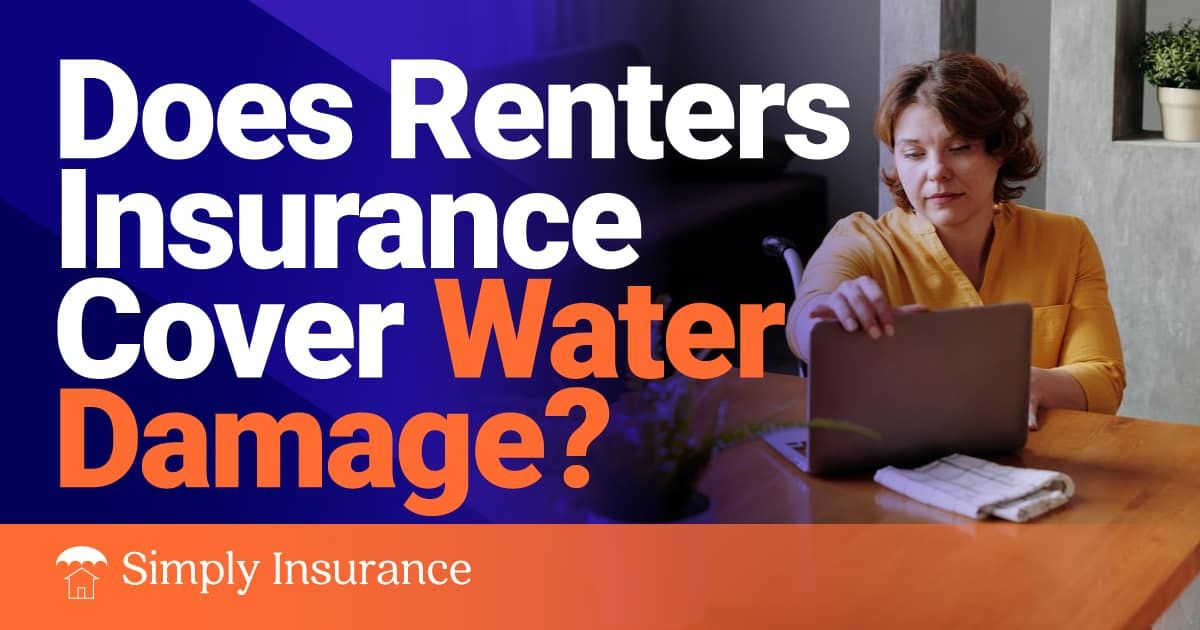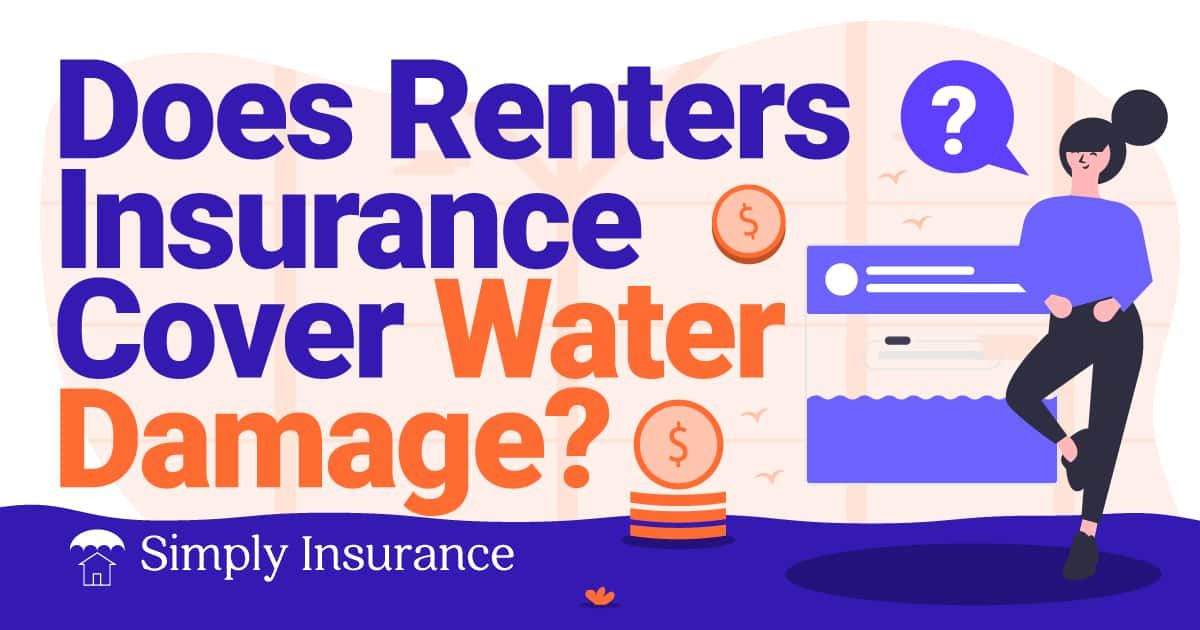Renters insurance provides a financial safety net in a range of unforeseen scenarios from theft to fire—but does renters insurance cover water damage?
The answer is a bit more complicated than a simple yes or no.
It depends on the type of water damage and the source of the water.

Here is everything you need to know about water damage and renters insurance coverage.
What Is Considered Water Damage?
Water damage is just what it sounds like—damage done by water.
That could include rotten wood, mold, destroyed papers, and more. In rentals, leaks and toilet overflows are the most common sources of water damage.
Other possibilities include excessive condensation from your air conditioner or flooding.
Water damage types are as diverse as their sources.
Water damage varies in severity, with clean water damage being the least severe and black water damage being the most dangerous.
Here's an overview of the three types of water damage:
Is a tenant responsible for water damage? Fortunately, no.
Landlords are required to carry property insurance to protect the building's structure and electrical components.
You don't have to pay anything out of pocket if water compromises your carpet, walls, or ceiling.
However, that won’t cover your personal belongings—and that’s where renters insurance comes in.
THE SIMPLY INSURANCE WAY
Renters Insurance made easy.
Agents not required.
Get quotes and sign up online without talking to an agent. But, we are here if you need us.
Unbiased, expert advice.
Get unbiased insurance education from licensed experts and also avoid excessive sales calls.
Coverage in minutes.
You can get renters insurance coverage within minutes of getting your quotes and applying.
Does Renters Insurance Cover Water Damage?
As mentioned, renters insurance may cover water damage. It depends on the source. Let’s take a look at a few common water damage scenarios.
Does Renters Insurance Cover Water Damage from Ceiling Leaks?
When it comes to water damage caused by ceiling leaks, the short answer is yes, renters insurance will usually cover damage to your possessions.
For example, if water drips from another apartment through your ceiling and soaks your bed, renters insurance would cover the bed.
It wouldn’t cover any damage to the walls and ceiling, though. Your landlord’s property insurance would cover that.
Does Renters Insurance Cover Water Damage from My Toilet Flooding?
Renters insurance covers most instances of toilet flooding. That includes accidental discharges or overflows that force water onto your apartment floor.
However, insurance won't compensate you for a loss if you create a clog that leads to the overflow.
While you don’t have to pay for the toilet flooding damage, you should still fill out a liability claim.
If your landlord tries to sue you for damages, renter insurance can cover the legal fees up to a limit, regardless of whether you win or lose the case.
The insurance agency also pays for damage if the court finds you liable.
Does Renters Insurance Cover Water Damage From Frozen Pipes?
Yes, renters insurance will cover water damage to your property from a burst frozen pipe. Your landlord's property insurance would cover the pipe repair and any damage to the building.
Does Renters Insurance Cover Water Damage From a Fish Tank?
In most cases, yes, any personal property damage caused by water from the tank would be covered.
The cost of your tank and the fish inside is another matter. That depends on how the tank was damaged.

For instance, if someone breaks into your apartment and ransacks the place breaking your tank in the process, insurance will likely cover the cost of the tank.
However, if the tank just springs a leak one day, that's not covered. Likewise, unless you have earthquake coverage, if an earthquake topples the tank, it and your fish aren't covered.
Does Renters Insurance Cover Flood Damage?
Flood damage is the glaring exception to water damage covered by renters insurance.
It, along with earthquakes, are two of the most common natural disasters in the US, and both require separate policies.
If you want to protect your apartment and belongings from flood damage, contact your insurance company about adding additional coverage.
The average price of flood insurance from the National Flood Insurance Program is $700 per year.
The premiums vary state-to-state with residents along the Gulf Coast paying the most and the Northeast paying the least.
Coverage maximums are typically around $250,000 for dwellings and $100,000 for possessions.
Renters insurance covers some types of natural water damage, including rain and storms.
For instance, an insurance company will reimburse you if torrential rain breaks your window and soaks your belongings.
If the damage makes your apartment uninhabitable, renters insurance also pays basic living expenses until the damage is repaired.
What Types of Water Damage Aren’t Covered?
Natural flooding is the biggest exception to renters insurance coverage, but it is not the only one.
Some policies have provisions that omit coverage in case of sewage water damage.
Some companies also won’t cover gradual damage. For instance, mildew, rot, and corrosion can slowly destroy possessions.
Insurers argue that you should anticipate these events and take preventative action to avoid loss.
Renters insurance covers you and those around you. It will pay for damage to a neighbor’s property, whether you left the sink running or had a dishwasher leak.
Take steps to minimize potential water damage with proactive maintenance.
Basics tricks include regularly checking and cleaning appliances and pipes and investigating leaks immediately after you find them.
Consider purchasing a water detection device, which beeps when in contact with excessive moisture.
Install it near your toilet, dishwasher, washing machine, or other household appliances.
RENTERS INSURANCE WHERE YOU LIVE
Renters insurance by state.
As a home renter, there are insurance policies available for you.
With quality Renters Insurance, you can protect your home and everything inside it. For more information, click on your state.
Taking Action
Renters insurance covers most forms of water damage, excluding flood or sewage water damage.
Consider taking out a separate policy if you live in a flood-prone area.
Remember that your landlord is responsible for structural maintenance, so you don't have to repair the walls, ceiling, or floors out-of-pocket.
Water damage is an in-depth issue, and there are far too many scenarios to cover them all here!
If you still don't have coverage now is the time to act, you can click here to compare rates and get instant coverage today..
